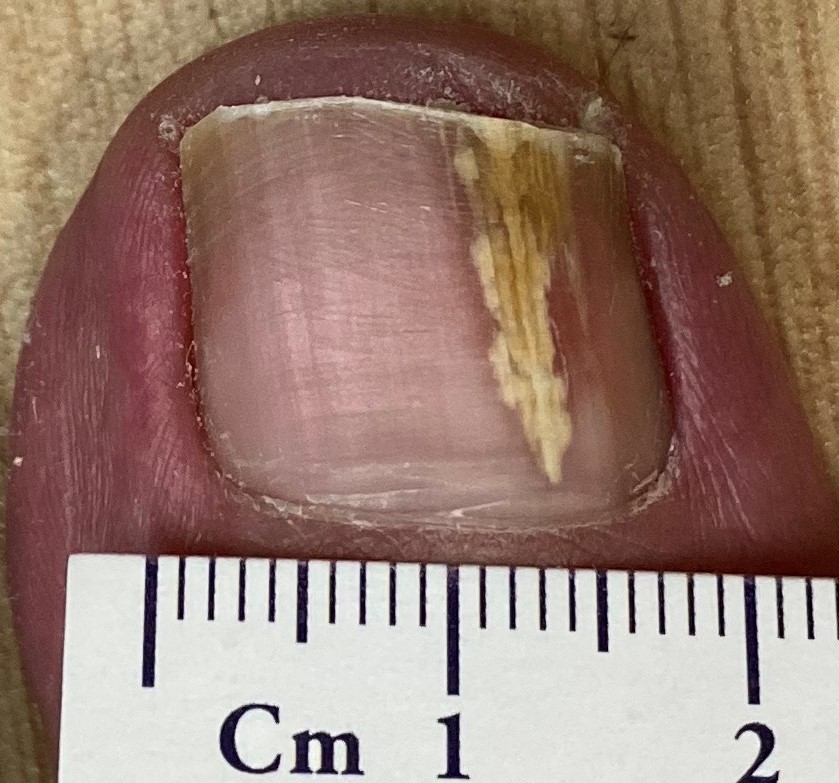SCOTTISH HEALTH tech pioneers have recruited a global medical expert to lead a clinical trial into fungal treatment for toes.
The unsightly infection affects millions of sufferers and is notoriously difficult to treat, but Scottish health tech firm Emblation hopes its microwave treatments could prove effective.
Its innovative Swift® device is already a global success in treating stubborn common and plantar warts and will now feature in a medical pilot study involving patients with the toenail condition.
Led by Dr Aditya K Gupta – one of the world’s foremost experts on the condition, known medically as onychomycosis – the pilot study will follow 45 patients who will each undergo 12 months of treatment.
Dr Matt Kidd, Director of Research and Development, at Stirling-based Emblation, said: “It is early in the process, but we are thrilled to have a formal pilot study underway and to have such an eminent expert as Dr Gupta to lead it.
“Any effective new treatment for this persistent and unsightly condition will be welcomed by both patients and clinicians, who have too few options available to them.
“All medical research is rightly very demanding and assessed at every stage, so there is some way to go before we have results, but we are all very excited about the possibilities.”
Dr Gupta is an extensively published expert in superficial fungal infections and a renowned dermatologist in Canada and, where he runs a dedicated mycology research laboratory.
He said the results would be eagerly awaited by many sufferers.
He added: “Onychomycosis is a pervasive and difficult condition to treat. Fungal nail infections can be unsightly in appearance, cause embarrassment, disrupt daily activities, and have a negative psychosocial connotation including low self-esteem, and social withdrawal.
“This is a condition with a large unmet medical need. We welcome Emblation in supporting our pilot investigational study as these patients presently have few effective treatment options.”
It is estimated that up to 12% of the population suffer from toenail fungus.
While some do not even notice the condition, many seek treatment on cosmetic grounds however, others end up with severely damaged and deformed toenails.
The condition usually affects the nail of the big toe, but can affect others and can even spread to finger nails
Sufferers are left with thickened, rough and yellowed nails which are brittle and prone to breaking off.
Sometimes entire nails lift off causing pain and swelling in the skin around the nail. In extreme cases patients have to undergo surgery to remove their toenails.
Treatments typically involve applying antifungal creams or lacquers multiple times a day for up to 12 months with patchy results.
Concerns are growing in the medical community that newer strains of the fungus have developed a resistance the anti-fungal creams and drugs most often used in treatment.
The idea of using Swift to treat toenail fungus evolved from discussions with podiatrists and other consultants who have been successful in using the technology to treat other conditions.
Dr Kidd from Emblation said: “We also did some early work with the University of Plymouth where we cultivated the fungus in a laboratory environment and treated it with microwaves with successful results. giving us confidence that we are on the right path.”
Taking place in London, Ontario, the pilot study (registered as NCT05674747) will see 45 patients randomly split into three groups of 15.
Group A will receive treatment weekly in the first month, then monthly for four months (nine treatments).
Group B will get fortnightly treatments in the first month followed by monthly treatment for four months (seven treatments), while Group C will get treatment every two weeks for six months (12 treatments).
Those who do not achieve results which match efficacy levels by month six or nine will be offered further monthly treatments. All patients will be monitored for 12 months.
Emblation was founded by Gary Beale and Eamon McErlean, who met during post-graduate studies at Heriot Watt university in Edinburgh. The firm’s growth was boosted in 2021 when it was backed by London-based specialist healthcare investors at Apposite Capital.
